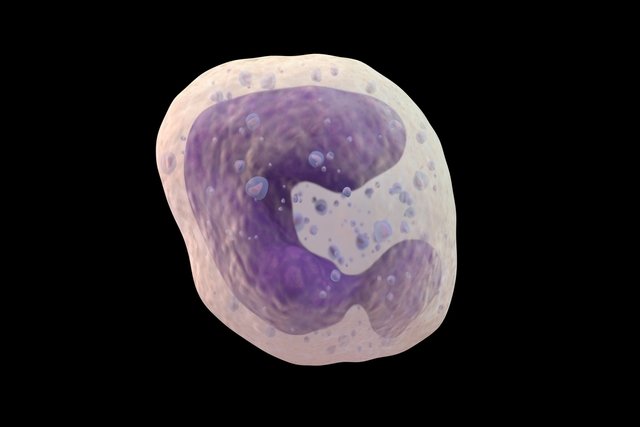Basophils are important system cells, and normally become increased with allergies or conditions related to prolonged inflammation like asthma, rhinitis or urticaria. Basophils have many diverse granules in their structure that release heparin and histamine to combat allergies and inflammation.
These cells are formed in the bone marrow and are a type of white blood cell. Levels are usually reported as part of a complete blood count.
Basophils are normally present in the blood in very small concentrations. Normal basophil levels are 0 - 2% or 20 - 100/µl in both men and women.

Normal basophil levels
Normal values of basophils in the blood are reported in comparison to the total amount of leukocytes in the blood. They usually make up 0 to 2% of total leukocytes. Basophil levels are considered to be normal when 20 to 100 basophils are found per microliter of blood.
Normal basophil reference levels are the same for men and women, however they may vary from lab to lab, which is why results should be assessed by the ordering doctor.
Low basophils
Basopenia, which is when basophils are low, is an uncommon situation and can occur due to a decrease in the production of white blood cells by the bone marrow. It is characterized by less than 20 cells per microliter of blood.
Basopenia can be caused by taking medications that weaken the immune system (e.g. corticosteroids), ovulation, pregnancy, periods of stress, hyperthyroidism and Cushing's syndrome.
High basophils
An increase in the number of basophils, also called basophilia, normally occurs when there is inflammation in the body, and is normally accompanied by other abnormalities in the white blood cell count. Some conditions that can cause high basophils include:
- Ulcerative colitis, characterized by inflammation in the gut
- Asthma, characterized by chronic inflammation of the lungs leading to difficulty breathing
- Sinusitis and rhinitis, characterized by sinus inflammation and frequent infections
- Arthritis, characterized by inflammation of the body's joints and causes pain
- Chronic renal failure, especially in cases of kidney malfunction, such as nephrosis
- Hemolytic anemia, which is characterized by the destruction of red blood cells, which compromises the oxygen and nutrient transport in the body
- Chronic Myeloid Leukemia, which is a type of cancer in which there is an imbalance in the production of bone marrow cells due to a mutation;
- After undergoing chemotherapy or surgical removal of the spleen
If basophilia is noted, it is important for results to be interpreted by the ordering doctor. Further tests may be needed to determine the underlying cause and direct treatment.
